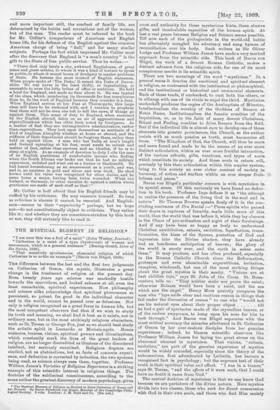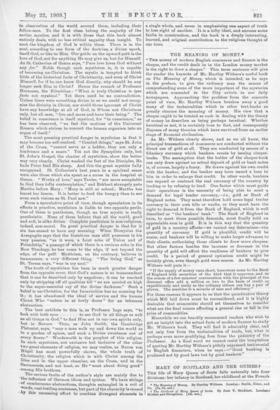THE MYSTICAL ELEMENT IN RELIGION.* "I am sure this was
a fool of a saint" (John Wesley, Journal).
"Catherine is a saint of a typo (hysterical) of woman not uncommon, which is a general nuisance" (Baring-Gould, Lives of the Saints, 1898).
"That massively spontaneous, elemental religion of which Catherine is so noble an example" (Baron von Hagel, 1908).
THE difference between the last and the first two judgments on Catherine of Genoa, the mystic, illustrates a great change in the treatment of religion at the present day. Even twenty years ago science was markedly hostile
towards the marvellous, and looked askance at all, even the least remarkable, spiritual experiences. Now philosophy and science alike acknowledge that spiritual phenomena so persistent, so potent for good in the individual character and in the world, cannot be passed over as delusions. Not only is religion recognised as a great force in human life, but the most competent observers feel that if we wish to study its truth and meaning, we shall find it hest as it exists, not in ordinary men, but in the most strikingly religious characters, such as St. Teresa or George Fox, just as we should best study the artistic spirit in Leonardo or Michelangelo. Hence ecstasies, trances, visions, spiritual powers and illuminations,
which constantly mark the lives of the great leaders of religion, are no longer discredited as illusions of the disordered intellect, but seriously examined. Religious dogmas are studied, not as abstractions, but as facts of concrete experi- ence, and deduction is corrected by induction, the two systems being used, as science always uses them, together. Professor William James's Varieties of Religious Experience is a striking example of this scientific interest in religious things. The doctrine of the subliminal consciousness, according to the same author the greatest discovery of modern psychology, gives * The Mystical Element ct Religion as Studied in Said Catherine of Genoa and her Friends. By Baron Pried.rich von Hugel, Member of the Cambridge Philo. logical Society. 2 vols. London: J. M. Dont and Co. [21s. net.]
room and authority for these mysterious hints, these elusive gifts, and incalculable capacities of the human spirit. At last a real peace between Religion and Science seems possible. Till now each of the protagonists in the world-old battle has alternately mangled his adversary and sung hymns of reconciliation over his body. Such writers as Sir Oliver Lodge and Professor William James have made a very marked approach from the scientific side. This book of Baron von Hiigel, the Work of a devout Roman Catholic, makes a distinct advance from the religious side, for one of its most conspicuous merits is its scientific spirit.
• There are two meanings of the word "mysticism." In a general sense it denotes the emotional and spiritual element in religion, as contrasted with the intellectual or philosophical, and the institutional or historical and ceremonial elements. Each of these tends, if unchecked, to oust both the others, or in alliance with one of its rivals to expel the third. Mysticism unaheckeI produces the orgies of the Anabaptists of Munster. Intellectualism the worship of the Goddess of Reason at Notre Dame, Institutionalism the fanatic, cruelties of the Inquisition, or, as in time faith of many devout Christians, Ritual and Feeling combine to drive Reason from the field. But if the individual life is almost sure to develop one of these elements into greater prominence, the Church, as the author insists with as much passion as truth, must harmonise all three. "The Kingdom of God, the Church, will thus be more and more found and made to be the means of an ever more distinct articulation, within an over more fruitful interaction, of the various at traits, gifts, vocations, and types of souls which constitute its society. And these souls in return will, precisely by this their articulation within this ampler system, bring to this society an ever richer content of variety in harmony, of action and warfare within an ever deeper fruit- fulness and peace."
Baron von Hagen particular concern is with mysticism in its special sense. Of this curiously we have found no defini- tion in his book. Professor Inge defines it as "the attempt to realise the presence of the living God in the soul and in nature." Sir Thomas Browne speaks finely of it in the con- eluding sentences of Urn Burial :—"Pions spirits who passed their dayes in raptures of futurity, made little more of this world, than the world that was before it, while they lay obscure in the Chaos of pre-ordination and night of their forebeings. And if any have been so happy as truly to understand Christian annihilation, extasis, exolution, liquefaction, trans- formation, the kisse of the Sponse, gustation of God and ingression into the Divine shadow, they have already had an handsome anticipation of heaven ; the glory of the world is surely over, and the earth in ashes unto them." It may produce, and has often produced, especially in the Roman Catholic Church since the Reformation, grotesque and even abominable superstitions, levitation, vampires, witchcraft, but one of the most striking things about the great mystics is their sanity. "Visions are at best childish toys," says St. John of the Cross. St. Bona- ventura tells us : "They neither make nor prove the saint ; otherwise Balaam would have been a saint, and the ass which saw the angel." Henry More quaintly compares the. man who "lays aside clear and cautious reason in things that fall under the discussion of reason" to one who " would not use his natural eyes about their proper object till he had a pair of spectacles made of the crystalline heaven, or of the caelum empyreum, to hang upon his nose for him to look through." And Baron von Iliigel separates with the most critical accuracy the miracles attributed to St. Catherine of Genoa by her over-zealous disciples from her genuine experiences ; indeed, he blames scientific observers like Professor William James for laying too great stress on the abnormal element in mysticism. That visions, " extasie,
exolution," are part of the genuine experience of mystics would be widely conceded, especially since the theory of the
subconscious, first adumbrated by Leibnitz, has become a recognised fact in psychology; but the supreme test of their truth is their spiritual value and effect. "1 was in a trance," says St. Teresa, "and the effects of it were such, that I could have no doubt it came from God."
The central doctrine of mysticism is that we can know God because we are partakers of the divine nature. Here mystics divide into two classes, those who seek for direct communion with God in their own souls, and those who find Him mainly
in observation of the world around them, including their fellow-men. To the first class belong the majority of the earlier mystics, and it is with these that this book almost entirely deals, with no less critical sagacity than insight. To such the kingdom of God is within them. There is in the soul, according to one form of the doctrine, a divine spark, itself God, or like to Him. Our guide on the upward path is the lore of God, not for anything He may give us, but for Himself.
As St. Catherine of Genoa says, "Pure love loves God without any for." Noble though such mysticism is, it is capable of becoming tin-Christian. The mystic, is tempted to think little of the historical facts of Christianity, and even of Christ Himself, for if he can know God directly, why should he any longer seek Him in Christ? Hence the remark of Professor Hermann, the Ritschlian : "What is truly Christian is ipso facto not mystical." Yet there need be no contradiction. Unless there were something divine in us we could not recog- nise the divinity in Christ, nor could those ignorant of Christ have any knowledge at all of God, in Whom not Christians
only, but all men, "live and move and have their being." The belief in conscience is itself mystical, for "in conscience," as has been observed, 'ewe feel the motions of the Universal Reason which strives to convert the human organism into an organ of itself."
The most pressing practical danger in mysticism is that it may become too self-centred. "Created things," says St. John of the Cross, "cannot serve as a ladder, they are only a hindrance and a snare." Yet not the Synoptiets only, but St. John's Gospel, the charter of mysticism, show the better way very clearly. Christ washed the feet of the Disciples, He bade Peter feed His sheep. And this the great mystics fully recognised. St. Catherine's best years in a spiritual sense were also those which she spent as a nurse in the hospital at Genoa. "Works of love," says Tanler, "are more aoceptable to God than lofty contemplation," and Eckhart strangely puts Martha before Mary : "Mary is still at school; Martha has learnt her lesson. It is better to feed the hungry than to see even such visions as St. Paul saw."
From a speculative point of view, though speculation in its effects is practice, mysticism is liable to two opposite perils.
One of these is pantheism, though no true mystic is really pantheistic, None of them believe that all the world, good and evil, is alike divine. Complete pantheism is nonreligious, indeed, non-moral. Its great practical danger is that for it sin has ceased to have any meaning. When Dionysius the Areopagite says that the licentious man still possesses in his very passion, "as it were, a faint echo of Union and of
Friendship," a passage of which there is a curious ecbo in the New Theology, lie has come to the edge, if not beyond the
edge, of the gulf. Mysticism, on the contrary, believes in immanence, a very different thing. "Time living God," as St. Teresa says, "was in my soul," The truth of mysticism has been in much greater danger from the opposite error, that God's nature is so transcendent that it can be described only by negatives ; it can be reached only by stripping off all qualities till "we are carried on high 'to the super-essential ray of the divine darkness." Such a
belief is un-Christian, for the Incarnation has no meaning for 'It; it has abandoned the ideal of service and the human
The best antidote to this is, as Professor Inge says, "to look with both eyes to see God in all things as well as all things in God," to find Him not in our own spirits only, but in Nature. Thus, as John Smith, the Cambridge Platonist, says, "may a man walk up and down the world as in a garden of spices, and suck a Divine sweetness out of 'very flower." Wordsworth is the prophet of this religion. In such mysticism, not exclusive bat inclusive of the other two great elements of religion, We may realise, as Baron von Hiigel has most powerfully shown, the whole truth of `Christianity, the religion which is with Christ among the lilies and in the upper chamber, on the Cross, and in the Sacraments, and not least, as Ho "went about doing good" among His brethren.
The serious faults of the author's style are mainly due to -the influence of German idiom and syntax. We have etrings of cumbersome abstractions, thoughts entangled in a coil of 'words, vast trailing sentenoes, but part of the obscurity is caused by this unceasing effort to combine divergent elements in
a single whole, and never in emphasising one aspect of truth to lose sight of another. 'It is a lofty ideal, and excuses seine faults in construction, and the book is a deeply interesting, learned, and original contribution to the' religious thought of our time.











































 Previous page
Previous page